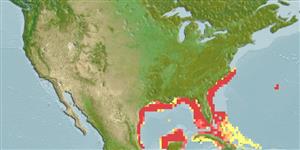Common names from other countries
Teleostei (teleosts) >
Pleuronectiformes (Flatfishes) >
Paralichthyidae (Large-tooth flounders)
Etymology: Paralichthys: Greek, para = the side of + Greek, ichthys = fish + Greek, suffix, oides = similar to (Ref. 45335).
More on authors: Jordan & Gilbert.
Environment: milieu / climate zone / depth range / distribution range
Ecology
Marine; demersal; depth range 19 - 130 m (Ref. 26938). Subtropical; 37°N - 7°N, 98°W - 59°W
Western Atlantic: North Carolina to southern Florida, USA, northern Bahamas, Gulf of Mexico, Caribbean Sea, Colombia to Trinidad and Tobago.
Size / Weight / Age
Maturity: Lm ? range ? - ? cm
Max length : 71.0 cm TL male/unsexed; (Ref. 26938); common length : 35.0 cm TL male/unsexed; (Ref. 3275); max. published weight: 2.8 kg (Ref. 40637)
Occurs in bays, lagoons and shallow coastal waters (Ref. 7251). Inhabits mainly hard and sandy bottoms (Ref. 3275).
Life cycle and mating behavior
Maturities | Reproduction | Spawnings | Egg(s) | Fecundities | Larvae
Distinct pairing (Ref. 205).
Robins, C.R. and G.C. Ray, 1986. A field guide to Atlantic coast fishes of North America. Houghton Mifflin Company, Boston, U.S.A. 354 p. (Ref. 7251)
IUCN Red List Status (Ref. 130435)
CITES (Ref. 128078)
Not Evaluated
Threat to humans
Harmless
Human uses
Fisheries: minor commercial
Tools
Special reports
Download XML
Internet sources
Estimates based on models
Preferred temperature (Ref.
115969): 21.1 - 27.5, mean 24.2 (based on 84 cells).
Phylogenetic diversity index (Ref.
82804): PD
50 = 0.5000 [Uniqueness, from 0.5 = low to 2.0 = high].
Bayesian length-weight: a=0.00646 (0.00290 - 0.01435), b=3.17 (2.99 - 3.35), in cm Total Length, based on LWR estimates for this Genus-body shape (Ref.
93245).
Trophic level (Ref.
69278): 4.3 ±0.6 se; based on size and trophs of closest relatives
Resilience (Ref.
120179): Medium, minimum population doubling time 1.4 - 4.4 years (Preliminary K or Fecundity.).
Fishing Vulnerability (Ref.
59153): Moderate to high vulnerability (48 of 100).
